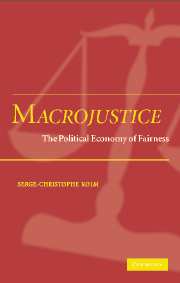Book contents
- Frontmatter
- Contents
- Presentation
- PART ONE BASES: CONSENSUS, FREEDOMS, AND CAPACITIES
- PART TWO OVERALL DISTRIBUTIVE JUSTICE: ELIE (EQUAL LABOUR INCOME EQUALIZATION)
- PART THREE COMPARISONS WITH POLICIES AND PHILOSOPHIES
- PART FOUR THE DEGREE OF COMMUNITY, EQUALITY, RECIPROCITY, AND SOLIDARITY
- 17 The degree of redistribution, solidarity, community, and reciprocity
- 18 Impartiality, consensus, and information
- 19 Disinterested judgments and the moral surplus
- 20 Communication and dialog
- 21 Impartialization to consensus
- PART FIVE COMPARISON WITH ECONOMICS' SOCIAL ETHICS
- References and bibliography
- Index
20 - Communication and dialog
Published online by Cambridge University Press: 31 July 2009
- Frontmatter
- Contents
- Presentation
- PART ONE BASES: CONSENSUS, FREEDOMS, AND CAPACITIES
- PART TWO OVERALL DISTRIBUTIVE JUSTICE: ELIE (EQUAL LABOUR INCOME EQUALIZATION)
- PART THREE COMPARISONS WITH POLICIES AND PHILOSOPHIES
- PART FOUR THE DEGREE OF COMMUNITY, EQUALITY, RECIPROCITY, AND SOLIDARITY
- 17 The degree of redistribution, solidarity, community, and reciprocity
- 18 Impartiality, consensus, and information
- 19 Disinterested judgments and the moral surplus
- 20 Communication and dialog
- 21 Impartialization to consensus
- PART FIVE COMPARISON WITH ECONOMICS' SOCIAL ETHICS
- References and bibliography
- Index
Summary
DIALOGICAL ETHICS
Consensus, information, communication, dialog
Endogenous social choice endorses the views common to the members of the considered society provided they are sufficiently informed and reflective (and other people's rights are respected). When these people disagree, they usually begin by discussing, trying to convince one another in exchanging information about facts, reasons, and values. This sometimes suffices to produce a consensus; at least, it often makes views and preferences closer to one another. Moreover, full relevant information is necessary for an ethical view which cannot rest on ignorance, mistaken beliefs, confusion, and misunderstanding. And, for social and notably distributive issues, full relevant information of an individual implies information about others that a priori only these others have. This may include knowing others' interests and situations, but it also includes information about others' views: formative information is about the reasons and other causes of others' social and ethical preferences, and empathetic information is about knowing others' corresponding feelings including feeling how they feel (Chapter 18). This essential information about others generally has to come directly or indirectly from them. Hence, communication involving society members has a basic role.
Therefore, the information transmitted is about facts, reasons, and also sentiments and feelings. The communication has to be mutual and reciprocal. It also generally takes an iterative form. Indeed, the information individuals want to transmit to others depends on what they know about others' information and judgments, as well as on their own information and judgments.
- Type
- Chapter
- Information
- MacrojusticeThe Political Economy of Fairness, pp. 324 - 335Publisher: Cambridge University PressPrint publication year: 2004



